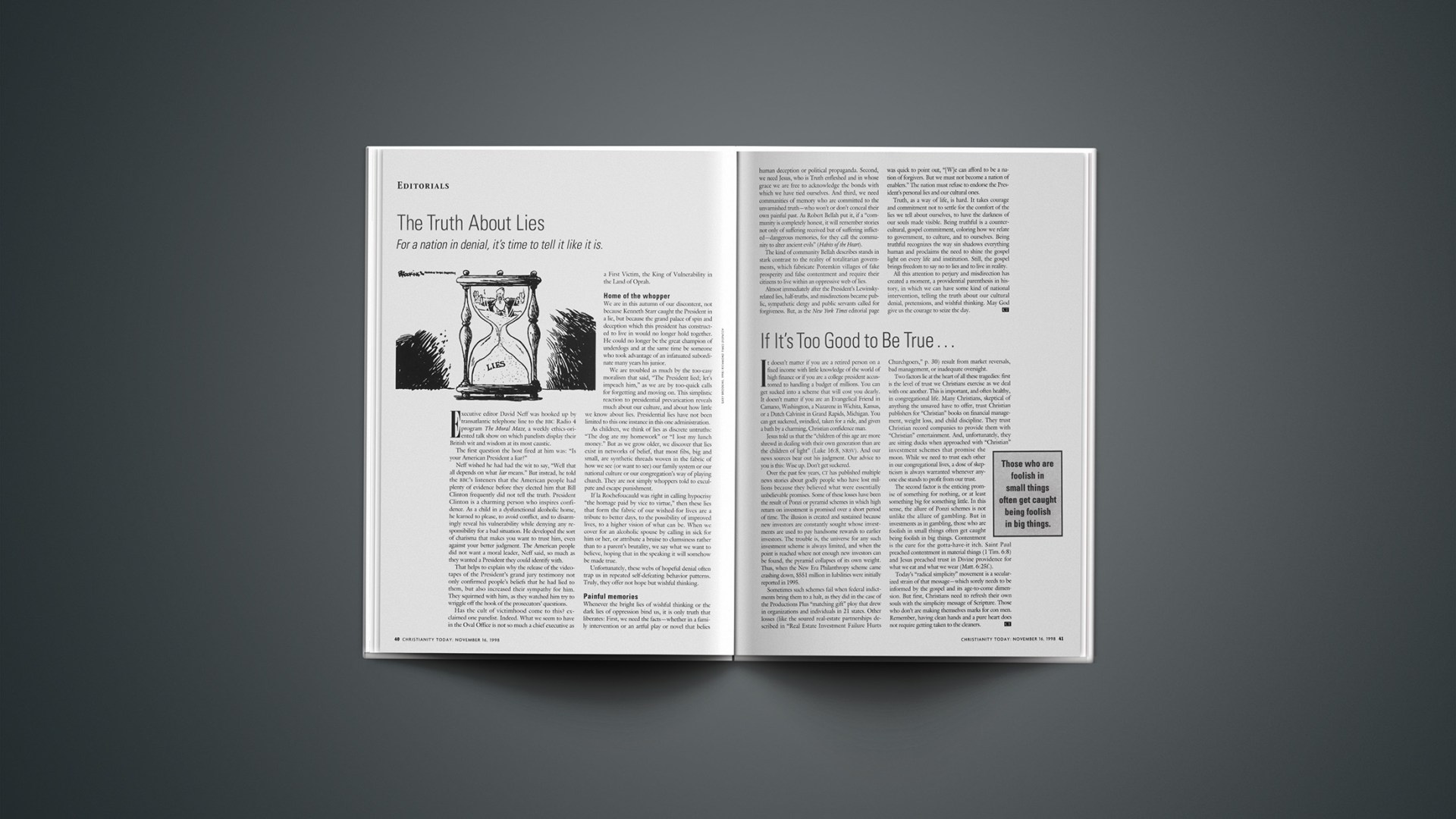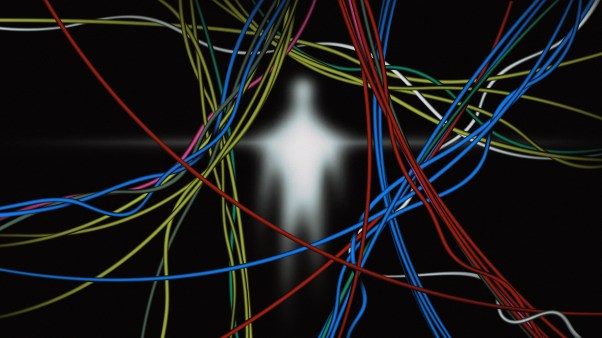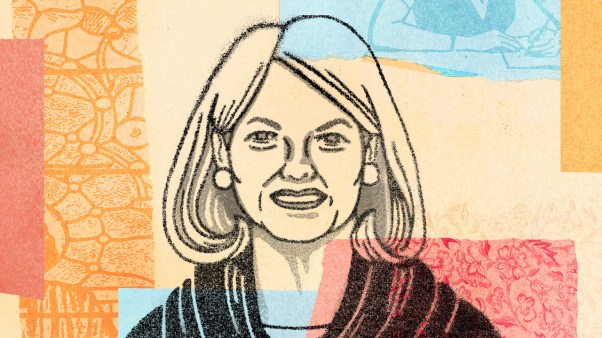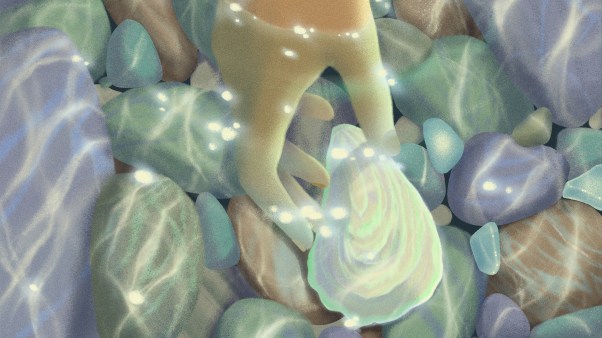Executive editor David Neff was hooked up by transatlantic telephone line to the BBC Radio 4 program The Moral Maze, a weekly ethics-oriented talk show on which panelists display their British wit and wisdom at its most caustic.
The first question the host fired at him was: “Is your American President a liar?”
Neff wished he had had the wit to say, “Well that all depends on what liar means.” But instead, he told the BBC’s listeners that the American people had plenty of evidence before they elected him that Bill Clinton frequently did not tell the truth. President Clinton is a charming person who inspires confidence. As a child in a dysfunctional alcoholic home, he learned to please, to avoid conflict, and to disarmingly reveal his vulnerability while denying any responsibility for a bad situation. He developed the sort of charisma that makes you want to trust him, even against your better judgment. The American people did not want a moral leader, Neff said, so much as they wanted a President they could identify with.
That helps to explain why the release of the videotapes of the President’s grand jury testimony not only confirmed people’s beliefs that he had lied to them, but also increased their sympathy for him. They squirmed with him, as they watched him try to wriggle off the hook of the prosecutors’ questions.
Has the cult of victimhood come to this? exclaimed one panelist. Indeed. What we seem to have in the Oval Office is not so much a chief executive as a First Victim, the King of Vulnerability in the Land of Oprah.
Home of the whopper
We are in this autumn of our discontent, not because Kenneth Starr caught the President in a lie, but because the grand palace of spin and deception which this president has constructed to live in would no longer hold together. He could no longer be the great champion of underdogs and at the same time be someone who took advantage of an infatuated subordinate many years his junior.
We are troubled as much by the too-easy moralism that said, “The President lied; let’s impeach him,” as we are by too-quick calls for forgetting and moving on. This simplistic reaction to presidential prevarication reveals much about our culture, and about how little we know about lies. Presidential lies have not been limited to this one instance in this one administration.
As children, we think of lies as discrete untruths: “The dog ate my homework” or “I lost my lunch money.” But as we grow older, we discover that lies exist in networks of belief, that most fibs, big and small, are synthetic threads woven in the fabric of how we see (or want to see) our family system or our national culture or our congregation’s way of playing church. They are not simply whoppers told to exculpate and escape punishment.
If la Rochefoucauld was right in calling hypocrisy “the homage paid by vice to virtue,” then these lies that form the fabric of our wished-for lives are a tribute to better days, to the possibility of improved lives, to a higher vision of what can be. When we cover for an alcoholic spouse by calling in sick for him or her, or attribute a bruise to clumsiness rather than to a parent’s brutality, we say what we want to believe, hoping that in the speaking it will somehow be made true.
Unfortunately, these webs of hopeful denial often trap us in repeated self-defeating behavior patterns. Truly, they offer not hope but wishful thinking.
Painful memories
Whenever the bright lies of wishful thinking or the dark lies of oppression bind us, it is only truth that liberates: First, we need the facts—whether in a family intervention or an artful play or novel that belies human deception or political propaganda. Second, we need Jesus, who is Truth enfleshed and in whose grace we are free to acknowledge the bonds with which we have tied ourselves. And third, we need communities of memory who are committed to the unvarnished truth—who won’t or don’t conceal their own painful past. As Robert Bellah put it, if a “community is completely honest, it will remember stories not only of suffering received but of suffering inflicted—dangerous memories, for they call the community to alter ancient evils” (Habits of the Heart).
The kind of community Bellah describes stands in stark contrast to the reality of totalitarian governments, which fabricate Potemkin villages of fake prosperity and false contentment and require their citizens to live within an oppressive web of lies.
Almost immediately after the President’s Lewinsky-related lies, half-truths, and misdirections became public, sympathetic clergy and public servants called for forgiveness. But, as the New York Times editorial page was quick to point out, “[W]e can afford to be a nation of forgivers. But we must not become a nation of enablers.” The nation must refuse to endorse the President’s personal lies and our cultural ones.
Truth, as a way of life, is hard. It takes courage and commitment not to settle for the comfort of the lies we tell about ourselves, to have the darkness of our souls made visible. Being truthful is a countercultural, gospel commitment, coloring how we relate to government, to culture, and to ourselves. Being truthful recognizes the way sin shadows everything human and proclaims the need to shine the gospel light on every life and institution. Still, the gospel brings freedom to say no to lies and to live in reality.
All this attention to perjury and misdirection has created a moment, a providential parenthesis in history, in which we can have some kind of national intervention, telling the truth about our cultural denial, pretensions, and wishful thinking. May God give us the courage to seize the day.
Copyright © 1998 Christianity Today. Click for reprint information.










